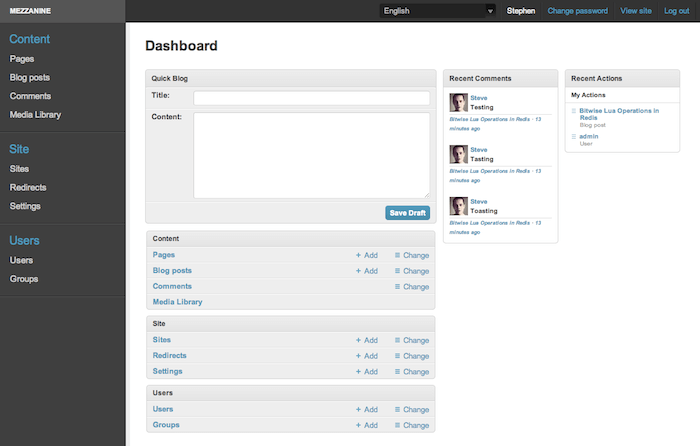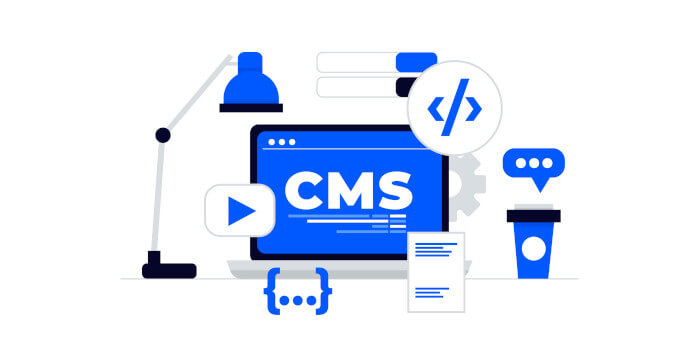Mezzanine is a powerful, consistent, and flexible content management platform.
Built using the Django framework, Mezzanine provides a simple yet highly extensible architecture that encourages diving in and hacking on the code.
In some ways, Mezzanine resembles tools such as WordPress, providing an intuitive interface for managing pages, blog posts, form data, store products, and other types of content. But Mezzanine is also different. Unlike many other platforms that make extensive use of modules or reusable applications, Mezzanine provides most of its functionality by default. This approach yields a more integrated and efficient platform.
Features include:
- Hierarchical page navigation.
- Save as draft and preview on site.
- Scheduled publishing.
- Drag-and-drop page ordering.
- WYSIWYG editing.
- In-line page editing.
- Drag-and-drop HTML5 forms builder with CSV export.
- SEO friendly URLs and meta data.
- Ecommerce / Shopping cart module (Cartridge).
- Configurable dashboard widgets.
- Blog engine.
- Tagging.
- Free Themes, and a Premium Themes Marketplace.
- User accounts and profiles with email verification.
- Translated to over 35 languages.
- Sharing via Facebook or Twitter.
- Multi-lingual sites.
- Custom templates per page or blog post.
- Twitter Bootstrap integration.
- API for custom content types.
- Search engine and API.
- Seamless integration with third-party Django apps.
- One step migration from other blogging engines.
- Automated production provisioning and deployments.
- Disqus integration, or built-in threaded comments.
- Gravatar integration.
- Google Analytics integration.
- Twitter feed integration.
- bit.ly integration.
- Akismet spam filtering.
- Built-in test suite.
- JVM compatible (via Jython).
Website: github.com/stephenmcd/mezzanine
Support:
Developer: Stephen McDonald and contributors
License: BSD 2-Clause “Simplified” License

Mezzanine is written in Python. Learn Python with our recommended free books and free tutorials.
Return to Python-Based Web Content Management Systems
| Popular series | |
|---|---|
| The largest compilation of the best free and open source software in the universe. Each article is supplied with a legendary ratings chart helping you to make informed decisions. | |
| Hundreds of in-depth reviews offering our unbiased and expert opinion on software. We offer helpful and impartial information. | |
| The Big List of Active Linux Distros is a large compilation of actively developed Linux distributions. | |
| Replace proprietary software with open source alternatives: Google, Microsoft, Apple, Adobe, IBM, Autodesk, Oracle, Atlassian, Corel, Cisco, Intuit, and SAS. | |
| Awesome Free Linux Games Tools showcases a series of tools that making gaming on Linux a more pleasurable experience. This is a new series. | |
| Machine Learning explores practical applications of machine learning and deep learning from a Linux perspective. We've written reviews of more than 40 self-hosted apps. All are free and open source. | |
| New to Linux? Read our Linux for Starters series. We start right at the basics and teach you everything you need to know to get started with Linux. | |
| Alternatives to popular CLI tools showcases essential tools that are modern replacements for core Linux utilities. | |
| Essential Linux system tools focuses on small, indispensable utilities, useful for system administrators as well as regular users. | |
| Linux utilities to maximise your productivity. Small, indispensable tools, useful for anyone running a Linux machine. | |
| Surveys popular streaming services from a Linux perspective: Amazon Music Unlimited, Myuzi, Spotify, Deezer, Tidal. | |
| Saving Money with Linux looks at how you can reduce your energy bills running Linux. | |
| Home computers became commonplace in the 1980s. Emulate home computers including the Commodore 64, Amiga, Atari ST, ZX81, Amstrad CPC, and ZX Spectrum. | |
| Now and Then examines how promising open source software fared over the years. It can be a bumpy ride. | |
| Linux at Home looks at a range of home activities where Linux can play its part, making the most of our time at home, keeping active and engaged. | |
| Linux Candy reveals the lighter side of Linux. Have some fun and escape from the daily drudgery. | |
| Getting Started with Docker helps you master Docker, a set of platform as a service products that delivers software in packages called containers. | |
| Best Free Android Apps. We showcase free Android apps that are definitely worth downloading. There's a strict eligibility criteria for inclusion in this series. | |
| These best free books accelerate your learning of every programming language. Learn a new language today! | |
| These free tutorials offer the perfect tonic to our free programming books series. | |
| Linux Around The World showcases usergroups that are relevant to Linux enthusiasts. Great ways to meet up with fellow enthusiasts. | |
| Stars and Stripes is an occasional series looking at the impact of Linux in the USA. | |
